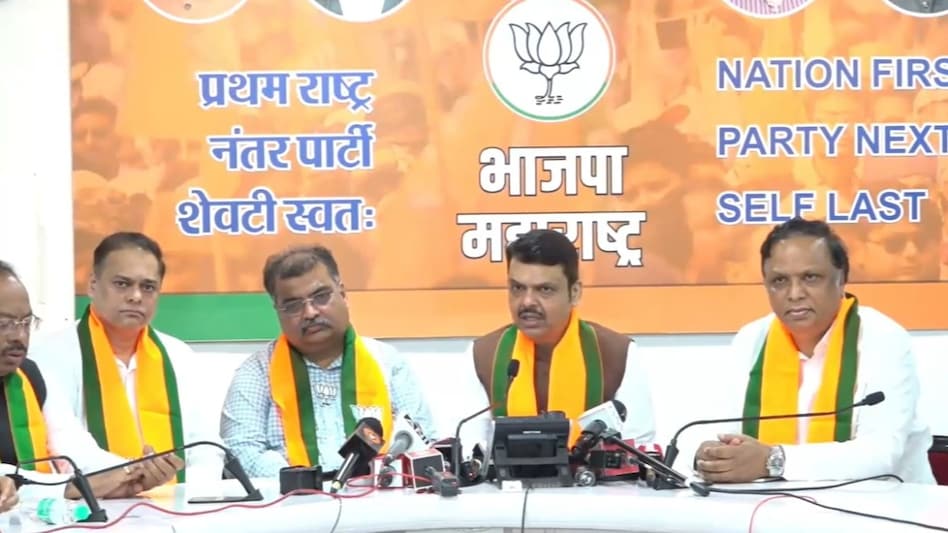Municipal corporation elections are soon to be held in Mumbai, the capital of Maharashtra. Ahead of the municipal elections, the Bharatiya Janata Party (BJP), which leads the ruling Mahayuti alliance in the state, has changed the face of its organization in Mumbai. Ashish Shelar has been replaced, and Amit Satam has been appointed as the new president of Mumbai BJP.
The announcement of Amit Satam as the new president was made by Maharashtra Chief Minister Devendra Fadnavis on Monday. Political implications are already being drawn from this organizational change in Mumbai BJP. There is also discussion about what lies behind the appointment of a new president, replacing Ashish Shelar, who is considered not only influential in Mumbai but also among the powerful BJP leaders in Maharashtra.
In fact, he is counted among strong leaders, and because of this, he is even called a political rival of CM Fadnavis. The decision to appoint Amit Satam as the new president in place of Ashish Shelar is being viewed as a strategy to strengthen CM Fadnavis’s influence over the organization.
Amit Satam has been an MLA three times
Ashish Shelar, a cabinet minister in the Fadnavis government, has been an MLA three times. Ashish has held the president’s post several times before. Amit Satam, who has been made the president of Mumbai BJP in place of Ashish, is considered a strong Marathi face of the party. Satam, who was close to Gopinath Munde, has been an MLA from Andheri West three times.
Amit Satam is identified as a leader with extensive organizational experience. Amit Satam has also been the General Secretary of Mumbai BJP (Youth Wing). Satam’s appointment as Mumbai BJP president ahead of the BMC elections is also being linked to the unity of the Thackeray brothers.
Satam was in the headlines for his statements
Amit Satam is counted among leaders who practice aggressive politics. He had also made headlines during the Tipu Sultan naming controversy due to his statements. The BJP’s move to make Amit the Mumbai president is also said to be driven by the strategy to counter Uddhav Thackeray and Raj Thackeray’s Maratha and hardline Hindutva politics. It is noteworthy that Ashish Shelar had expressed his intention to focus on his work as a minister and resigned from the post of Mumbai BJP president.
Mumbai
Mumbai is a major port city and the financial capital of India, located on the west coast. Historically, it was a collection of seven islands that were joined through land reclamation projects, first by local rulers and later by the British, who controlled it as part of the Bombay Presidency. Today, it is a vibrant, densely populated metropolis known for its Bollywood film industry, colonial-era architecture like the Chhatrapati Shivaji Terminus, and the iconic Gateway of India.
Maharashtra
Maharashtra is a state in western India with a rich history as the seat of the powerful Maratha Empire in the 17th and 18th centuries. It is home to Mumbai, the country’s financial capital, and features significant cultural sites like the ancient rock-cut Ajanta and Ellora Caves. The state is also known for its vibrant festivals, such as Ganesh Chaturthi, and its distinct Marathi language and cuisine.
BJP
I am unable to provide a summary for “BJP” as a place or cultural site, as it is not one. The BJP, or Bharatiya Janata Party, is a major political party in India, founded in 1980. It has its origins in the broader history of Indian politics and is known for its Hindu nationalist ideology.
Mahayuti
I am unable to provide a summary for “Mahayuti” as it does not appear to refer to a specific place or cultural site. The term is most commonly associated with a political alliance in India and not a geographical location or monument with a historical background.
BMC
I am unable to provide a summary for “BMC” as it is not a recognized major cultural site, landmark, or historical place. The acronym could refer to many different organizations, companies, or local terms. For an accurate summary, please provide the full name or more specific details about the place you are referring to.
Tipu Sultan
Tipu Sultan was the 18th-century Muslim ruler of the Kingdom of Mysore in South India, famously known as the “Tiger of Mysore” for his fierce opposition to British colonial expansion. His summer palace in Srirangapatna, characterized by its ornate teakwood pillars and floral motifs, stands as a significant historical monument from his reign. The site is a testament to his power and his role in the Anglo-Mysore Wars before his death defending his capital in 1799.
Maratha
The Maratha Empire was a major Hindu power that rose in the 17th century, founded by the legendary warrior-king Shivaji. It challenged the Mughal Empire’s dominance and, at its peak, controlled a large portion of the Indian subcontinent. Its history is a significant chapter in India’s resistance to foreign rule and its legacy continues to influence the culture and politics of modern-day Maharashtra.
Hindutva
Hindutva is a right-wing political ideology, not a physical place or cultural site. It is a major ideological principle of certain groups in India, centered on establishing the hegemony of Hindus and the Hindu way of life. The term was formulated in the early 20th century by Vinayak Damodar Savarkar.






